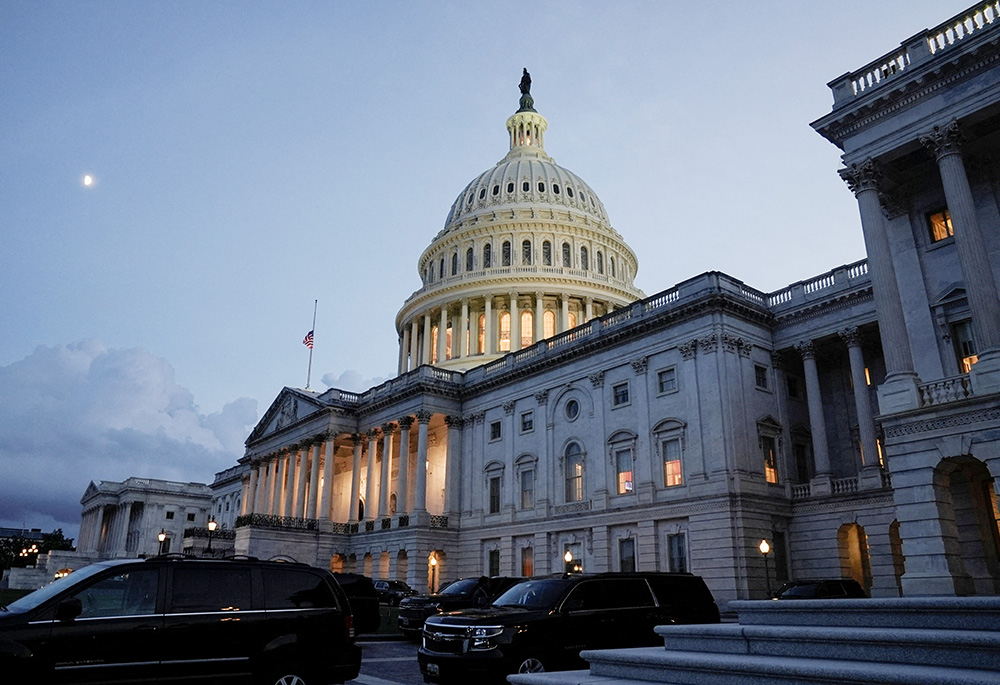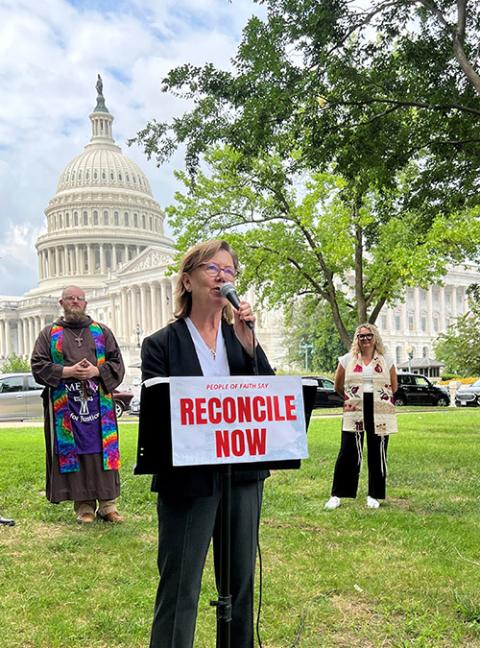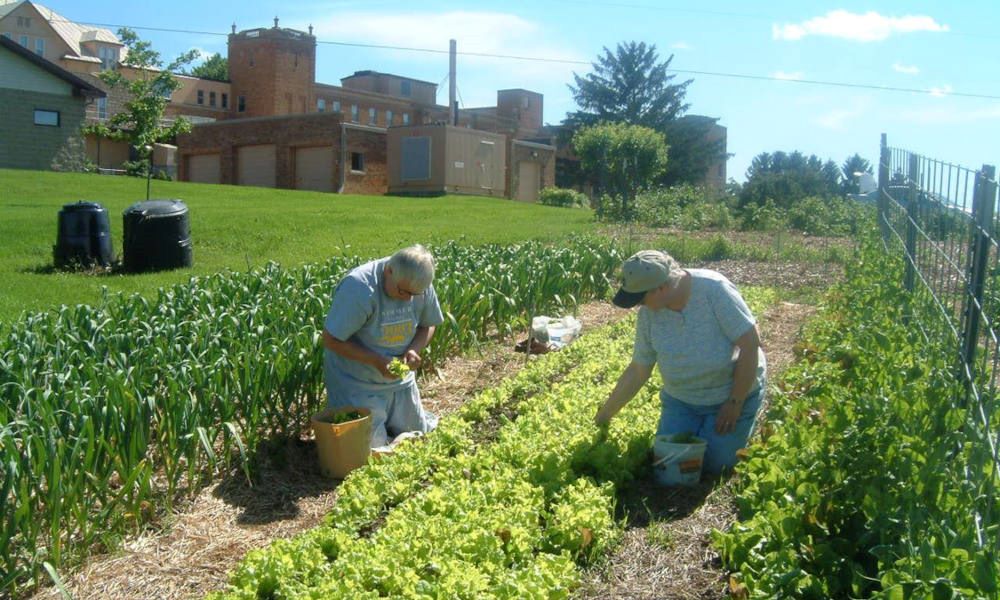
The U.S. Capitol is seen in Washington Aug. 6, 2022. (CNS/Reuters/Ken Cedeno)
Thanks to a recent $2 million gift from the Franciscan Sisters of Perpetual Adoration, Network Lobby for Catholic Social Justice, a Washington, D.C.-based advocacy organization founded by religious sisters more than 50 years ago, will expand its lobbying portfolio on Capitol Hill to include climate advocacy.
The Franciscan Sisters of Perpetual Adoration, based in La Crosse, Wisconsin, and Network describe this new "collaboration in mission" as emerging from their shared commitment to "confront the existential threat of our time that is climate change," according to a joint press release issued by the two groups.
The first $500,000 donation from the Franciscan Sisters of Perpetual Adoration will complete Network's 50th anniversary endowment fund campaign. The remaining $1.5 million will support the expansion of Network's political ministry into the climate justice arena, which will include hiring more staff and acquiring a larger office space to start.
"We know we cannot do everything alone," said Sr. Sue Ernster, president of the congregation. "This moment calls for a more unified Catholic sister voice ... to face the enormous challenge of climate change. Whom we bring together for mission matters, just as whom Jesus called as his disciples mattered."

Mary Novak, Network executive director, speaks at a 2022 rally on Capitol Hill. (Courtesy of Network Lobby)
Network's decision to add the issue area of climate justice came out of its own recent strategic planning process, as well as ongoing calls from women's religious communities and other climate advocacy organizations, said executive director Mary Novak.
Network's aim is not to duplicate the work spearheaded by other Catholic entities, she added, but to build upon it.
"We are still listening to our Catholic colleagues to determine the full scope of what Network is called to do," Novak said, "so that we can be a value-add to the climate justice advocacy ecosystem that exists already. We want to fill the gaps and strengthen and expand existing efforts."
She hesitated to elaborate on specific legislation that Network will take up, calling that premature.
This August, Novak will be on-site in Wisconsin to meet with the Franciscan Sisters of Perpetual Adoration to share the initial results of her meetings with other organizations that share the climate space in Washington, D.C.
She also hopes to learn more about the congregation's long-standing commitments and partnerships in the work of integral ecology, an approach to addressing the climate crisis that Pope Francis underscored in his 2015 encyclical, "Laudato Si', on Care for Our Common Home." Integral ecology sees the current environmental, social and economic crises as inextricably intertwined, requiring a holistic approach where "right relationships" are centered.
"I'll be able to fill [the sisters] in on the results of our listening process and our discernment on Network's initial scope," Novak said, "and then we're going to invite their input. ... This move into climate justice advocacy really does flow from the wisdom and discernment of the sisters."
Novak anticipates having a scope of work identified by midyear.

Franciscan Sisters of Perpetual Adoration work in the garden at their Greenfield, Wisconsin, property. The sisters have permanently committed the former farmland for sustainability and ecological projects. They consider the land "the visible handiwork of God." (Courtesy of FSPA)
For the Franciscan Sisters of Perpetual Adoration, this new partnership with Network was forged specifically with Laudato Si' in mind, using the "seven-year Laudato Si' Action Platform journey to intensify actions for greater social and environmental justice," Ernster said. The sisters have committed the use of their land near their motherhouse, St. Rose Convent in La Crosse, to model sustainability practices and spiritual values, including a green burial option for the sisters.
"Both FSPA and Network recognize the need to have monetary support [for this work]," Ernster said, "but more importantly, we share the vision to evolve the work of environmental justice into right relationships at all levels."
José Aguto, executive director of the Catholic Climate Covenant, called this new alliance and Network's foray into the climate justice lobby "fantastic" news. "For 50 years, Network has been lifting up the moral voice of the sisters, one of the most powerful moral voices we have nationally and globally; this is a real boon for those of us working for climate action."
Aguto said that Catholic Climate Covenant was open wholeheartedly to collaborating with Network. Catholic Climate Covenant had set its own goal of being more intentional about potential institutional collaborations in the coming year.
"It's about all of us within the Catholic community dialing down our institutional egos to come to more unified positions, so that the Catholic voice is one of greater influence. In other words, us living into the value we celebrate at Mass of one bread, one body."
Advertisement
Network was founded by Catholic sisters in 1972 in the spirit of the 1962-65 Second Vatican Council to respond to the issues of the day showing up in congregations' various ministries. The goal was to create a nationwide network of women religious who would engage in political activism at the federal level for social justice.
Early lobbying priorities included poverty, congressional reform, minimum wage, child care, consumer protection, the environment, farmworker rights, health care, opposition to the Vietnam War, prison reform, tax fairness, welfare reform and women's rights. This agenda has evolved over succeeding decades as new issues such as immigration reform have emerged on Capitol Hill.
Network's recently completed six-year strategic plan (to coincide with the timing of federal elections) prioritizes influencing federal policies that dismantle systemic racism, center equity and reparative justice, build economic security, secure democracy, and protect the Earth.
"Our foundational commitment is to center racial justice and equity at the heart of our ministry," Novak said, "and hold ourselves accountable to communities of color, both inside and outside of our organization. It's part of the large mosaic where we understand ourselves called."
Aguto surmised that Network's moral voice would add a powerful ingredient to the Catholic climate advocacy space.
"One of the dimensions I imagine the sisters will bring to their dialogue with legislators is a moral call and an ability to reach them in their hearts beyond concerns about getting re-elected," he said. For Catholics, "this is our 'section of the orchestra', so to speak, and we need to reach into the hearts of legislators contrary to the way political culture is operating in America."
Editor's note: In 2020, the Franciscan Sisters of Perpetual Adoration gifted $1.5 million to the National Catholic Reporter to amplify integral ecological education and journalism in the spirit of Laudato Si'. This donation ensured that environmental reporting and stories of climate crisis, faith and action would become permanent components of NCR's coverage.








